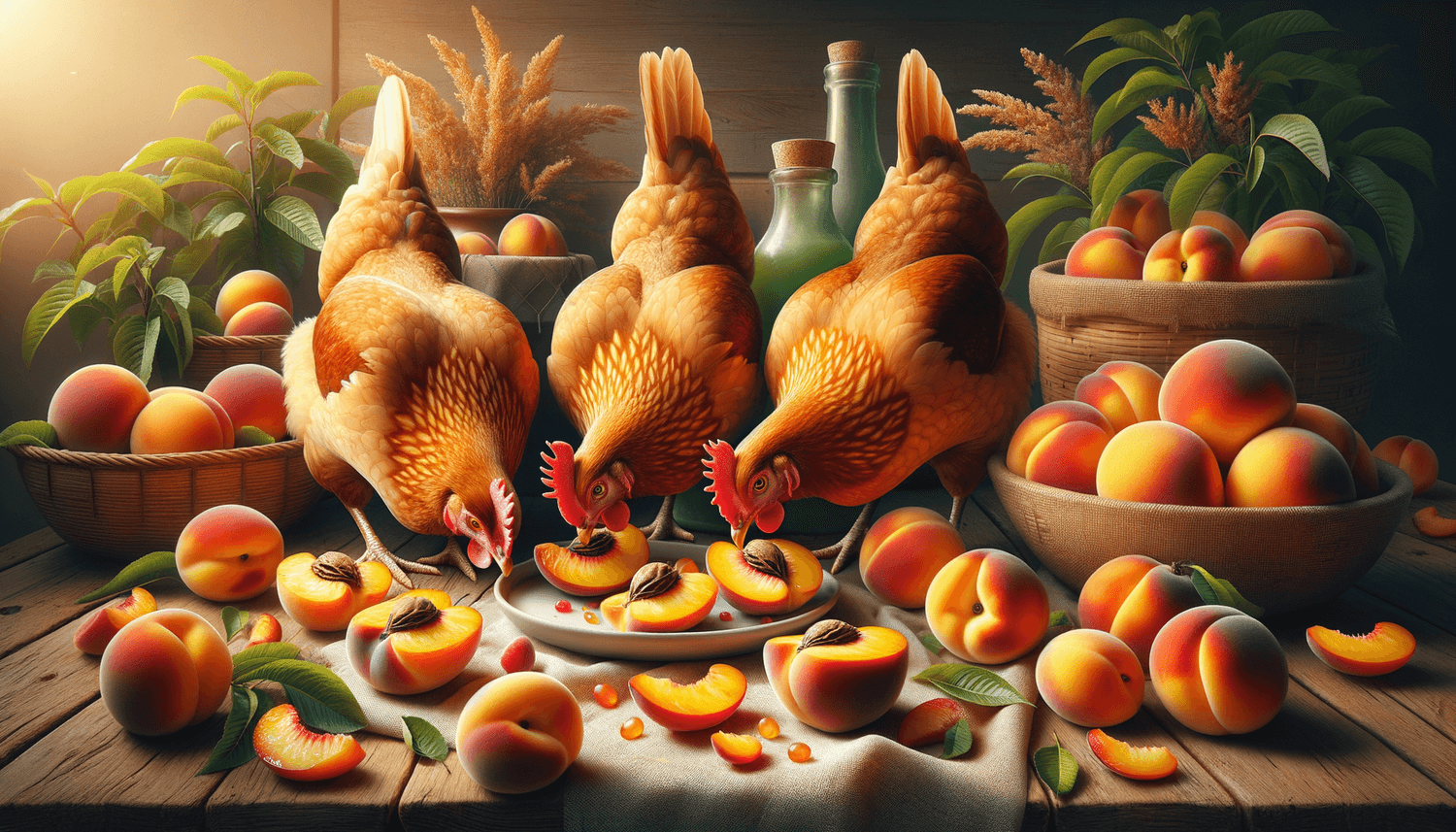Are your feathery friends giving you the side-eye as you enjoy a juicy peach and you can’t help but wonder, can chickens eat peach skins? Well, my dear fellow chicken enthusiasts, you’re in for a treat! In this egg-citing blog post, we’ll dive beak-first into whether our clucky companions can munch on those tasty peach skins, the dos and don’ts of a balanced chicken diet, the benefits and possible risks of this fruity delight, its nutritional value, and even some tips on how to prepare peaches for your beloved flock. So, freshen up that coop and let’s get cracking!
Can chickens eat peach skins?
Yes, chickens can eat peach skins, and it is generally safe for them to do so. Peach skins can offer some nutritional benefits to your flock, such as vitamins and antioxidants. However, moderation is key, as feeding your chickens too many peach skins can lead to an unbalanced diet, potentially causing health issues.
A balanced diet for happy chickens
Just like us humans, chickens thrive on a balanced diet to maintain their overall health and wellbeing. A key component of this balanced diet is high-quality chicken feed, which should form the foundation of their daily nutritional intake. This chicken feed is specially formulated to ensure your feathered friends get all the necessary nutrients they need to prosper, from protein for muscle development to minerals for strong bones and eggshell formation.
Chicken feed should make up around 80-90% of your chicken’s diet, providing a solid basis for them to grow and flourish. The remaining 10-20% can be made up of treats, such as fruits and vegetables, sprinkled in for variety and enjoyment. These extras add a fun element to their mealtime, but it’s important to keep them balanced and not let them overindulge on these goodies. So, when considering peach skins for your chickens, remember to offer them as an occasional treat, keeping their overall diet well-rounded and nutritious.
Nutritional value of peach skins for chickens.
Feeding peach skins to your chickens can offer them some valuable nutritional benefits to help maintain their overall health. One of the highlights of peach skins is their rich vitamin content, particularly vitamins A and C. Vitamin A plays a crucial role in supporting the immune system, maintaining healthy skin and feather growth, and promoting good vision. Vitamin C, on the other hand, serves as an antioxidant that boosts the immune system and aids in fighting off infections.
In addition to vitamins, peach skins also contain essential minerals such as potassium and magnesium. Potassium is vital for the proper functioning of muscles, nerves, and enzymes, while magnesium is involved in energy production, nerve function, and bone development. On top of that, peach skins provide hydration for your chickens, as they contain a substantial amount of water, which can be especially beneficial during hot summer days to prevent dehydration.
Lastly, the fibrous nature of peach skins can contribute positively to the overall digestive health of your chickens. This fiber helps maintain a healthy digestion, supports the absorption of nutrients, and ensures your chickens have a comfortable gut. So, while peach skins may not be a staple in your flock’s diet, these occasional treats offer a range of nutritional benefits that can contribute to the well-being of your feathered friends.
Nutrition table of peach skins for chickens.
| Information | Description |
|---|---|
| Nutritional Value | Rich in vitamins A and C, potassium, and magnesium. |
| Suggested Serving Size | Small pieces, comprising no more than 10-20% of their overall diet. |
| Safe Feeding Practices | Feed in moderation, ensure to remove pits, and wash thoroughly before feeding. |
| Preparation | Remove pits, chop into small pieces, and serve fresh. |
| Potential Risks | Feeding large quantities may lead to an unbalanced diet and potential health issues. |
| Hydration | Peach skins are a good source of water, helping to keep chickens hydrated. |
| Digestion | The fibrous nature of peach skins promotes healthy digestion and nutrient absorption. |
| Seasonal Availability | Typically available during summer months, peaking in July and August. |
| Other Benefits | Antioxidants in peach skins help support the immune system of chickens. |
Peach pit precautions
While peach skins are a delightful treat for your chickens, it’s important to note that peach pits should be avoided. Peach pits contain a chemical called amygdalin, which breaks down into cyanide when ingested. Cyanide can be toxic to chickens, so it’s essential to remove the pits before offering peach skins to your flock.
Adding variety to your chicken’s treats
Although peach skins offer benefits to your flock, it’s wise to mix up the treats you deliver to your chickens to ensure they’re getting a well-rounded diet. Don’t hesitate to incorporate other fruits and vegetables like leafy greens, strawberries, apples, or even squash. By providing a blend of healthy treats, you’ll keep mealtime exciting for your chickens, while also offering them essential nutrients for optimal health.
Keeping cleanliness in mind
When feeding your chickens any treat, cleanliness is crucial. Washing fruits like peaches thoroughly before giving them to your flock helps remove potential contaminants like dirt or pesticides, ensuring a safe and healthy snack for your birds. Additionally, don’t forget to clean up any leftovers to prevent spoilage and maintain a clean environment for your chickens.
In conclusion, peach skins can be a beneficial and tasty treat for your backyard chickens when fed in moderation. This fruity delight provides essential vitamins, minerals, and hydration to support their overall health. Keep the pits away, and remember to balance their diet with other treats and high-quality chicken feed. Happy chickens make for happy owners!

















